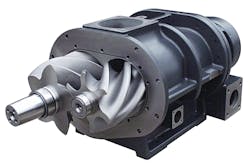Tech Tip: How to choose between a piston and rotary screw compressor
Automotive service shops typically choose between a piston and a rotary compressor. When deciding which one to buy, be sure to consider duty cycle, energy efficiency and maintenance costs. Knowing these differences can help you make the right decision for your shop.
- Duty cycle: Piston compressors have a 60-70 percent duty cycle. This means they can run 60-70 percent of the time without the risk of overheating and excessive wear and tear. Simply put, they need the downtime to cool off. Rotary (screw and vane) compressors, on the other hand, can run continuously. If duty cycle will be an issue, make sure you have back-up air for when the piston is offline.
- Energy efficiency: Pistons can typically deliver 3-4 cfm/hp while rotaries deliver 4-5 cfm/hp. Since you pay for kWh, you want to compare efficiencies in terms of kW and cfm. You can use CAGI data sheets to compare efficiencies (www.cagi.org) for rotary compressors. Pistons may be cheaper to purchase up front, but depending on size, usage and local power rates, a rotary may offer long-term savings with its better efficiency.
- Maintenance: Rotary compressors are more expensive to maintain than pistons. However, pistons will eventually wear to the point that they need major service. In this respect, they may not last as long as a rotary unit.
Information provided by: Kaeser Compressors, Inc.
